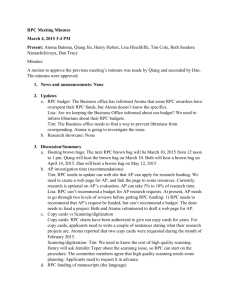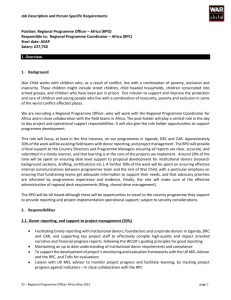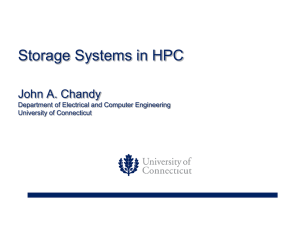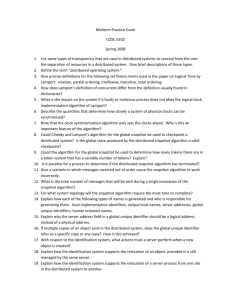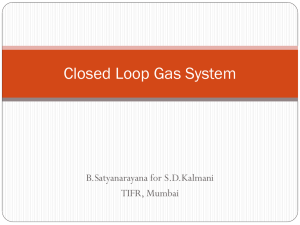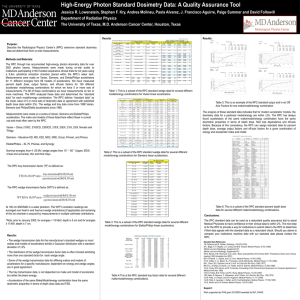Professional Practice in Human Resources
advertisement
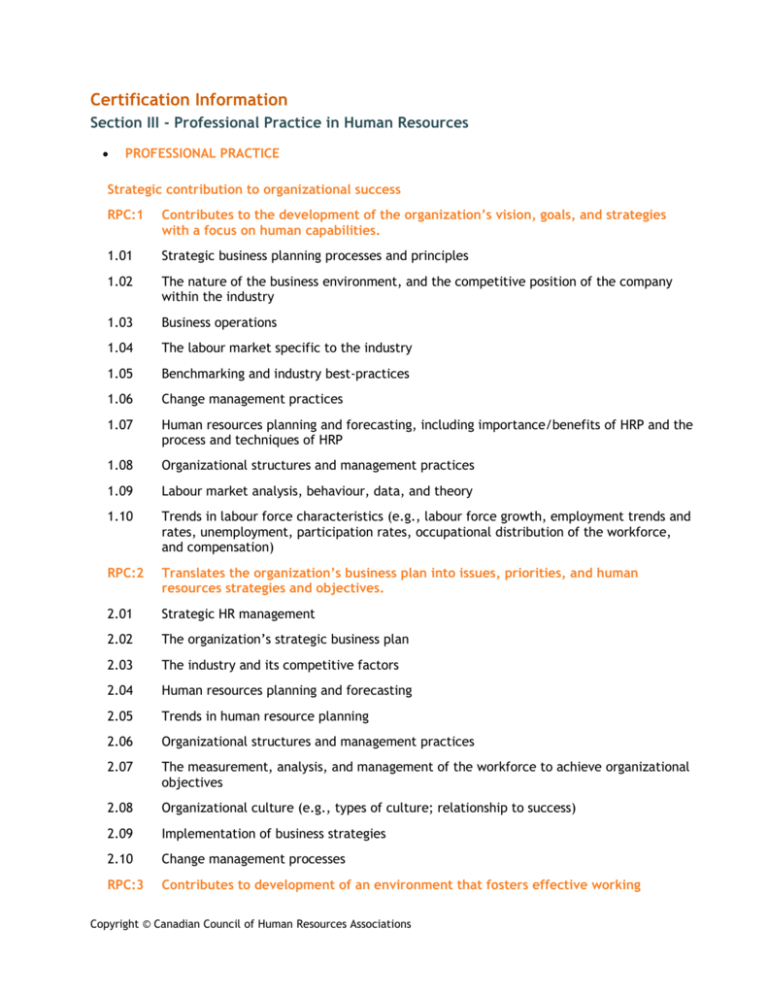
Certification Information Section III - Professional Practice in Human Resources PROFESSIONAL PRACTICE Strategic contribution to organizational success RPC:1 Contributes to the development of the organization’s vision, goals, and strategies with a focus on human capabilities. 1.01 Strategic business planning processes and principles 1.02 The nature of the business environment, and the competitive position of the company within the industry 1.03 Business operations 1.04 The labour market specific to the industry 1.05 Benchmarking and industry best-practices 1.06 Change management practices 1.07 Human resources planning and forecasting, including importance/benefits of HRP and the process and techniques of HRP 1.08 Organizational structures and management practices 1.09 Labour market analysis, behaviour, data, and theory 1.10 Trends in labour force characteristics (e.g., labour force growth, employment trends and rates, unemployment, participation rates, occupational distribution of the workforce, and compensation) RPC:2 Translates the organization’s business plan into issues, priorities, and human resources strategies and objectives. 2.01 Strategic HR management 2.02 The organization’s strategic business plan 2.03 The industry and its competitive factors 2.04 Human resources planning and forecasting 2.05 Trends in human resource planning 2.06 Organizational structures and management practices 2.07 The measurement, analysis, and management of the workforce to achieve organizational objectives 2.08 Organizational culture (e.g., types of culture; relationship to success) 2.09 Implementation of business strategies 2.10 Change management processes RPC:3 Contributes to development of an environment that fosters effective working Copyright © Canadian Council of Human Resources Associations relationships 3.01 Communication theories, tools, techniques, and processes 3.02 Work processes, the inter-dependence of workers and their productivity 3.03 General influences on human behaviour (e.g., motivation theory) 3.04 Behaviour of individuals, groups, and organizational units 3.05 Techniques in managing workforce diversity 3.06 Methods of creating interpersonal effectiveness 3.07 Employee recognition and reward strategies and practices RPC:4 Guides and advises the organization in the development and application of ethical practices. 4.01 Standards of professional practice 4.02 Codes of ethics and standards of the HR profession 4.03 Conflict management/resolution techniques 4.04 Industry best practices 4.05 Organization’s HR and business practices 4.06 Concepts and processes of power and organization politics 4.07 Issues related to privacy and the protection of information. 4.08 Influence tactics RPC:5 Keeps current with emerging HR trends. 5.01 HR issues, trends, developments and best practices 5.02 Business issues, trends, and developments 5.03 The importance/benefits of HR Planning 5.04 Trends in all functional areas of HR practice 5.05 Trends in labour force characteristics (e.g., labour force growth, employment trends and rates, unemployment, participation rates, occupational distribution of the workforce, and compensation) 5.06 Trends and issues affecting the particular industry 5.07 Global trends and issues in business/industry 5.08 Organizational behaviour, leadership and management practices in an international context Planning and Implementing HR Strategies RPC:6 Develops and implements a human resources plan that supports the organization’s strategic objectives. Copyright © Canadian Council of Human Resources Associations 6.01 Solutions for business problems/challenges 6.02 Benchmarking and industry best-practices 6.03 Customer needs (internal and external) 6.04 Change management processes 6.05 Techniques for developing and presenting business cases 6.06 Risk assessment techniques 6.07 Organizational structures and management practices 6.08 Strategic HR management 6.09 HR planning and forecasting RPC:7 Audits existing HR programs to ensure they are aligned with business objectives. 7.01 The organization’s strategic business plan and the goals of the business unit 7.02 Survey and data collection techniques 7.03 Statistical analyses and evaluation including validity and reliability concepts and assessment techniques 7.04 Benchmarking techniques and industry best-practices 7.05 HRIS/HRMS concepts 7.06 Current HR programs and practices 7.07 Research methods and designs 7.08 Measurement and assessment tools and techniques (and their limitations) 7.09 Techniques to evaluate effectiveness of HR programs (e.g., selection, training, and compensation, etc.) RPC:8 Provides the information necessary for organization to effectively manage its people practices. 8.01 Career and succession planning and management 8.02 Nature of internal working procedures and information flows 8.03 Contract administration 8.04 HR planning techniques 8.05 Trends in human resources information management. 8.06 HRMS concepts and techniques 8.07 Procedures for collection, manipulation, and analysis of information 8.08 The organization’s strategic business plan and the goals of the business unit 8.09 Use of business software Copyright © Canadian Council of Human Resources Associations 8.10 Statistical analyses and evaluation 8.11 HRMS project planning and management Measuring Strategic Organizational Results RPC:9 Evaluates the effectiveness of HR strategies, applying various measurement and assessment programs. 9.01 The company’s HR programs and culture of the organization 9.02 Measurement and assessment tools and techniques (and their limitations) 9.03 The organization’s strategic business plan and the goals of the business unit 9.04 Research methods and designs 9.05 Statistical analyses and evaluation including validity and reliability concepts and assessment techniques 9.06 Needs analysis 9.07 Strategic HR management practices and techniques 9.08 Techniques to evaluate effectiveness of HR programs (e,g., selection, training, and compensation, etc.) Business Acumen RPC:10 Applies business fundamentals of production, operations management, accounting & finance, information technology, marketing, and strategic planning to people management issues. 10.01 The organization’s strategic business plan and the goals of the business unit 10.02 The nature of the business environment, and the competitive position of the company within the industry 10.03 Basic production, operations, finance, IT, and marketing 10.04 Strategic planning 10.05 Measurement bases and underlying methodologies used in finance 10.06 Fundamentals of budgeting, financial and management accounting 10.07 Assessment and forecasting techniques for HR Requirements (including benefits and types of qualitative and quantitative forecasting methods) 10.08 Organizational strategic alternatives and their HRP implications 10.09 Competitive analysis and strategies 10.10 Strategic HR management practices and techniques RPC:11 Gathers, analyzes, and reports relevant business and industry information (including global trends) to influence the development of strategic business HR plans. 11.01 Sources of business/industry information Copyright © Canadian Council of Human Resources Associations 11.02 Global trends in business/industry 11.03 Analytical techniques/tools 11.04 Data validation techniques/tools 11.05 Procedures for collection, manipulation, and analysis of information 11.06 Organizational behaviour, leadership and management practices in an international context 11.07 Strategic HR management RPC:12 Develops business cases for HR initiatives and strategies. 12.01 Techniques for developing and presenting business cases 12.02 The organization’s issues/opportunities 12.03 Influence tactics 12.04 Methods of preparing operating budgets 12.05 Fundamentals of budgeting, financial and managerial accounting 12.06 Cost-benefit analyses (including audits, utility analysis, ROI and impact studies) RPC:13 Sets clear goals, objectives, evaluation standards, and measures for HR programs and strategies. 13.01 Goals of the organization 13.02 Client requirements and work plans 13.03 Work assignment/job design techniques 13.04 Work flow analysis 13.05 Measurement and assessment tools and techniques (and their limitations) 13.06 Procedures for collection, manipulation, and analysis of information 13.07 Techniques to evaluate effectiveness of HR programs (e.g. selection, training, and compensation, etc.) 13.08 Key HR initiatives and considerations 13.09 Strategic HR management 13.10 Goal setting processes and techniques RPC:14 Uses communication strategies to advance organizational objectives. 14.01 Communication theories, tools, techniques, and processes 14.02 Influence tactics Human Resource Information Management RPC:15 Ensures the HR information management function is fully capable of supporting the organization’s strategic and operational needs. Copyright © Canadian Council of Human Resources Associations 15.01 The organization’s strategic business plan and the goals of the business unit 15.02 HRMS and business software 15.03 Evaluation techniques and issues 15.04 Database concepts 15.05 Work flow models 15.06 Effective systems of managing HR information 15.07 Collection, manipulation, and analysis of information 15.08 Research methods and designs (including measurement of HR) 15.09 Measurement and assessment tools and techniques (and their limitations) 15.10 Importance, criteria, and techniques of program evaluation 15.11 Cost-benefit analyses (including audits, utility analysis, ROI , and impact studies) 15.12 Business operations RPC:16 Provides the organization with timely and accurate HR information. 16.01 The organization’s strategic business plan and the goals of the business unit 16.02 HRMS concepts 16.03 The use of HRMS and business software 16.04 The identification, assessment, development, implementation, and maintenance of effective systems of managing HR information 16.05 Procedures for collection, manipulation, and analysis of information 16.06 HRMS project planning and management 16.07 HR functions and activities 16.08 Business operations RPC:17 Ensures compliance with legislated and contractual requirements for information management (e.g., records of hours worked, records of exposure to hazardous substances). 17.01 Business operations 17.02 HRMS and business software 17.03 Contractual requirements 17.04 Information security and controls 17.05 Relevant legislation and regulations 17.06 Contract administration RPC:18 Contributes to development of specifications for the acquisition and/or development of HR information management systems and for their implementation. Copyright © Canadian Council of Human Resources Associations 18.01 HRMS concepts 18.02 HRMS project planning and management 18.03 Vendor and product assessment 18.04 Database concepts 18.05 Change management concepts 18.06 The identification, assessment, development, implementation and maintenance of effective systems of managing HR information 18.07 Procedures for collection, manipulation, and analysis of information 18.08 Design and development of HRMS 18.09 Research methods and designs (including measurement of HR) 18.10 Measurement and assessment tools and techniques (and their limitations) 18.11 HR functions and activities 18.12 Quantitative as well as qualitative concepts, approaches and techniques of HRP 18.13 Techniques for developing and presenting business cases RPC:19 Evaluates alternatives for meeting current and future information management needs. 19.01 Current and future business plans 19.02 HRMS and business software 19.03 Database concepts 19.04 Trends in HRMS including both theoretical and technical 19.05 The identification, assessment, development, implementation and maintenance of effective systems of managing HR information 19.06 Research methods and designs (including measurement of HR) 19.07 Measurement and assessment tools and techniques (and their limitations) 19.08 Statistical analyses and evaluation 19.09 HR functions and activities RPC:20 Contributes to the development of information management systems. 20.01 HRMS concepts 20.02 Data security concepts 20.03 Business operations 20.04 The identification, assessment, development, implementation and maintenance of effective systems of managing HR information 20.05 HRMS project planning and management Copyright © Canadian Council of Human Resources Associations 20.06 Design and development of HRMS 20.07 Privacy of information legislation and issues RPC:21 Ensures the availability of information needed to support the management decision making processes. 21.01 Operations management techniques 21.02 Organization, culture and business environment 21.03 Organization and industry benchmarks 21.04 Decision making theories 21.05 Business operations 21.06 Statistical analyses and evaluation 21.07 Procedures for collection, manipulation, and analysis of information RPC:22 Ensures HR administrative requirements conform to organizational policies as well as best practices, balancing confidentiality and operational requirements. 22.01 Organization’s HRMS systems and applications 22.02 Relevant technical applications 22.03 Database concepts 22.04 HRMS and business software 22.05 Relevant legislation, including that governing freedom of information and protection of privacy and employment contracts. 22.06 Corporate policy 22.07 HRMS security 22.08 Business needs and reporting requirements Manages Outside HR Contractors and Other Specialists RPC:23 Develops budgets, monitors expenditures and performance of outside HR contractors and other specialists. 23.01 Fundamentals of budgeting, financial and managerial accounting 23.02 Project management 23.03 Critical path scheduling and contingency planning 23.04 Cost estimation 23.05 Measurement bases and underlying methodologies used in finance departments 23.06 Issues in identifying relevant costs (e.g., cost accuracy vs. relevance; costs & pricing; irrelevant costs; costing collective bargaining proposals; cost-benefit analysis RPC:24 Develops requests for proposals (RFP) and reviews submissions by third parties. Copyright © Canadian Council of Human Resources Associations 24.01 Preparation and management of RFP process 24.02 Project management principles, concepts and techniques 24.03 Cost estimation and budgeting 24.04 Fundamentals of purchasing. Project Management RPC:25 Applies principles of project management to HR activities. 25.01 Project management principles, concepts and techniques 25.02 Critical path scheduling and contingency planning 25.03 Cost estimation and budgeting 25.04 Organizational culture, environment, and capabilities in terms of resources available and the commitment to implement 25.05 Budgetary control and responsibility accounting (including issues of static vs. flexible budgets; variance analysis; control systems) RPC:26 Assembles and leads teams to achieve established goals. 26.01 Project management principles, concepts and techniques 26.02 Leadership principles, concepts, and techniques 26.03 Selection, staffing and team evaluation 26.04 Team and individual performance management principles, concepts, and techniques 26.05 Group dynamics and team building processes RPC:27 Monitors expenditures and timelines. 27.01 Business software 27.02 Cost estimation 27.03 Variance analysis 27.04 Critical path scheduling 27.05 Fundamentals of budgeting and managerial accounting 27.06 Budgetary control and responsibility accounting (including issues of static vs. flexible budgets; management control systems) RPC:28 Evaluates progress on deliverables. 28.01 Project management principles, concepts, and techniques 28.02 Critical path scheduling and contingency planning 28.03 Cost estimation and variance analysis 28.04 Program evaluation, including balanced scorecard Copyright © Canadian Council of Human Resources Associations 28.05 Procedures for collection, manipulation, and analysis of information Legal/Legislative Framework- General Employment Relationship RPC:29 Identifies and masters legislation and jurisprudence relevant to HR functions. 29.01 Relevant legislation, regulations and jurisprudence 29.02 The organization, its operations, and general business environment 29.03 Applicable political, social, and cultural context and environment 29.04 Common law as it relates to employment issues RPC:30 Advises on the status of dependent and independent contractors and determinants of employee status. 30.01 Legislative framework and collective agreements 30.02 Business law related to contracts 30.03 Contract administration 30.04 Management of collective agreements (including grievance and arbitration) Human Rights RPC:31 Ensures the organization’s HR policies and practices align with human rights legislation. 31.01 Professional standards and codes of ethics 31.02 Relevant legislation, regulations and jurisprudence 31.03 The organization, its operations, and environment 31.04 Theories and practices for protection of individuals and groups 31.05 Techniques in managing workforce diversity 31.06 Applicable political, social, and cultural context and environment RPC:32 Leads an appropriate organizational response to formal or informal complaints or appeals related to alleged human rights, workplace or employment violations. 32.01 Relevant legislation, regulations and jurisprudence 32.02 Investigative techniques 32.03 Professional standards and cods of ethics 32.04 Applicable political, social, and cultural context and environment 32.05 Basic rules of evidence 32.06 Theories and practices for protection of individuals and groups 32.07 Techniques in managing workforce diversity 32.08 Change management practices Copyright © Canadian Council of Human Resources Associations Managing Client Relationships RPC:33 Develops and maintains the trust and support of collaborators including the immediate supervisor, subordinates and internal clients. 33.01 Professional standards and codes of ethics 33.02 Communication theories, tools, techniques, and processes 33.03 Group dynamics and team building processes 33.04 Methods of creating interpersonal effectiveness RPC:34 Develops and administers a departmental or project budget. 34.01 Fundamentals of budgeting, financial and managerial accounting 34.02 Organizational and department goals and objectives Professionalism RPC:35 Understands and adheres to the Canadian Council of Human Resources Association’s code of ethics and applicable provincial/territorial HR association’s codes. 35.01 CCHRA code of ethics 35.02 Organization values and culture 35.03 Processes used to resolve ethical issues RPC:36 Stays current with professional knowledge. 36.01 HR issues, trends, and developments 36.02 Business issues, trends, and developments 36.03 Information sources for professional development 36.04 Expectations and professional requirements for CHRP designation RPC:37 Fosters and promotes advancement of the profession. 37.01 HR best practices 37.02 Standards of professional practice 37.03 Professional association activities 37.04 The history of HRM 37.05 Communication theories, tools, techniques, and processes Governance RPC:38 Provides leadership and ensures compliance with legislative requirements concerning conflict of interest and other technical issues. 38.01 Applicable political, social, and cultural context and environment 38.02 Professional standards and codes of ethics Copyright © Canadian Council of Human Resources Associations 38.03 Industry practices 38.04 Relevant legislation, regulations and jurisprudence 38.05 Theories and practices for protection of individuals and groups 38.06 Investigative techniques 38.07 Basic rules of evidence RPC:39 Provides advice to governing bodies on design and implementation of HR related issues. 39.01 Trends in HR 39.02 Communication theories, tools, techniques, and processes 39.03 Influence techniques 39.04 Strategic HR management 39.05 Organizational issues and challenges RPC:40 Develops policy and governance requirements to safeguard the confidentiality of HR information ensuring compliance to applicable legislation and regulations. 40.01 Investigative procedures 40.02 HRMS concepts 40.03 Legislative requirements for confidentiality 40.04 Organization policies 40.05 Data security concepts 40.06 Business software 40.07 Business needs and reporting requirements 40.08 Privacy legislation 40.09 Privacy of information issues RPC:41 Assesses requests for HR information in light of corporate policy, freedom of information legislation, evidentiary privileges and contractual or other releases. 41.01 Freedom of Information and privacy legislation 41.02 Corporate policy 41.03 HRMS security 41.04 Privacy of information issues 41.05 Investigative procedures 41.06 Contracts Copyright © Canadian Council of Human Resources Associations
